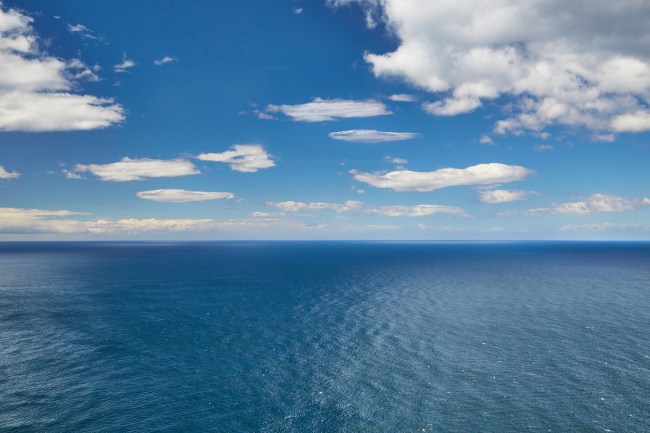
iStockphoto / Gudella
Our planet is always changing, but a scientific study claims that the Earth was once a waterworld that had no continents. Wait. Does that mean that Waterworld was a documentary? The study said that the Earth was covered in vast oceans 3.2 billion years ago. Wait. Does that mean that Waterworld a time-travel movie?
A new study titled “Limited Archaean continental emergence reflected in an early Archaean 18O-enriched ocean” published Monday in the peer-reviewed scientific journal Nature Geoscience brought evidence pointing out that ancient Earth was a waterworld. Don’t tell Kevin Costner, he is still probably having nightmares from 1995.
Two researchers from the University of Colorado-Boulder and Iowa State University noted an ancient piece of marine sediment in the arid inland of the Western Australian outback. Not exactly the place you would expect to find marine sediment.
RELATED: Scientists Found Breathable Oxygen In Another Galaxy For The First Time Ever
The Aussie area where the remnants of the ancient ocean were found is called “Panorama.” In the outback, geologists discovered leftovers in the oceanic crust from a time when the entire planet was covered in water.
Scientists examined 100 sediment samples from the Panorama, and it looked a lot like the oceans from billions of years ago. Researchers believe that 3.2 billion years ago that the composition of the oceans contained more oxygen-18 than oxygen-16, “the latter of which is more common in the modern ocean and is a slightly lighter isotope.” Oxygen-16 is a lighter isotope than the heavier Oxygen-18.
“Though these mass differences seem small, they are super sensitive,” said Boswell Wing, study co-author and an associate professor in the Department of Geological Sciences at the University of Colorado Boulder. “There’s nothing in what we’ve done that says you can’t have teeny, micro-continents sticking out of the oceans.”
“We just don’t think that there were global-scale formation of continental soils like we have today,” Wing added.
The belief is that there were no continents 3.2 billion years ago, and that the formation of continents absorbed the oxygen-18 isotopes from the oceans. Scientists believe that there were some land masses, but only small-sized islands on Earth, which likely formed 4.5 billion years ago.
“Our work doesn’t mean there was zero dry land, just that it must have been much, much smaller in extent than today, with only small island chains emergent above the ocean,” said Benjamin W. Johnson, an assistant professor of geological and atmospheric sciences at Iowa State. “This value is different than the modern ocean in a way that can be explained most easily by a lack of emergent continental crust.”
“There are no samples of really ancient ocean water lying around, but we do have rocks that interacted with that seawater and remembered that interaction,” said Johnson, who is the study’s other co-author.
The study gives scientists hope that other planets could evolve into water worlds that could sustain life.
“If the Earth was a water world for the first quarter or so of its history, then perhaps other Earth-like planets elsewhere in the galaxy would undergo a similar evolution,” Johnson said.
[protected-iframe id=”224bf0d3f697d8c0be5b696c630ad862-97886205-93291949″ info=”https://giphy.com/embed/ZCz3C4pQrbums” width=”480″ height=”258″ frameborder=”0″ class=”giphy-embed” allowfullscreen=””]
The study alleges that tectonic plates pushed the massive land masses up to create continents.
Let’s hope that the Earth doesn’t become a waterworld again, fighting for five limes on the high seas doesn’t look fun.
RELATED: Earth Is Getting A New Moon But We Can’t Land On It